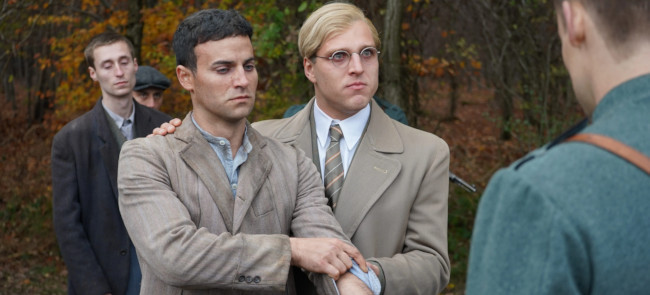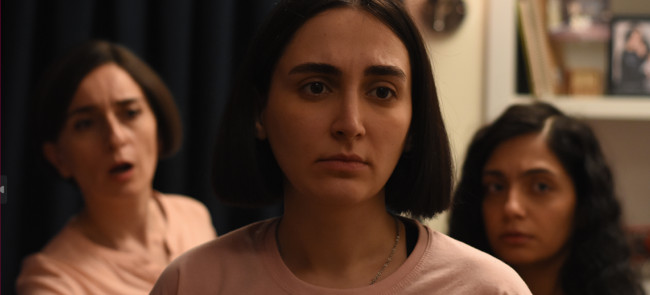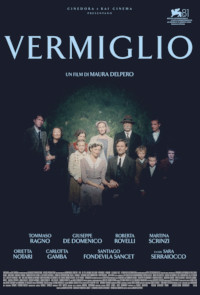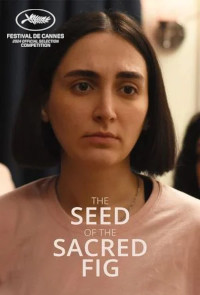| SHADOWS ON THE WALL | REVIEWS | NEWS | FESTIVAL | AWARDS | Q&A | ABOUT | TALKBACK | |||||||||||||||||||||
 Shadows off the beaten path Shadows off the beaten pathIndies, foreign, docs and shorts...
On this page:
BONHOEFFER |
THE SEED OF THE SACRED FIG |
VERMIGLIO
| |||||||||||||||||||||
| See also: SHADOWS FILM FESTIVAL | Last update 14.Dec.24 | |||||||||||||||||||||
|
Bonhoeffer Review by Rich Cline | 
| |||||||||||||||||||||
 dir-scr Todd Komarnicki prd Todd Komarnicki, Emmanuel Kampouris, Camille Kampouris, Ralph Winter, Mark O'Sullivan with Jonas Dassler, August Diehl, David Jonsson, Flula Borg, Moritz Bleibtreu, Nadine Heidenreich, Greg Kolpakchi, William Robinson, Phileas Heyblom, Lisa Hofer, James Flynn, Clarke Peters release US 22.Nov,24, UK 6.Dec.24 24/Belgium 2h13 Now streaming... |
 Crosscutting between the sunshiny sheen of youth and the grey horrors of 1945 Germany, this English-language biopic recounts the story of theologian Dietrich Bonhoeffer, who actively resisted Nazi rule. This is a fascinating portrait of an open-hearted deep thinker, musician and defender of deeper Christian principles against organised religion. So while the film feels a bit over-produced, it's also a riveting story that bristles with urgent themes. Devastated by his older brother's death in the Great War, young Dietrich (Heyblom) becomes interested in theology, pursuing further education in 1930 New York. Classmate Frank Fisher (Jonsson) introduces him to the African-American gospel tradition, which he embraces for its social relevance. Then as a 25-year-old professor back in 1933 Berlin, Dietrich speaks out against Hitler's rise to power. He also takes action, teaching in underground German seminaries, spreading news abroad of Nazi atrocities and participating in resistance activities with his brother-in-law Hans (Borg). They were arrested in 1943, and executed two years later. Along the way, the film includes a breathtaking account of how Hitler used hatred and fear, weaponising the Christian church to capture the support of the nation, which didn't take his darker ideas seriously until it was too late. Indeed, it's shocking that the Nazis rewrote the Bible itself. Against this, it's hopeful to see the resilience of those who refused to accept their racist rulers. As Dietrich says, pacifism isn't the same as silence; not to act is to act. Because writer-director Komarnicki takes time to include offhanded moments, humour and emotion, the film pulls us in deeply, allowing us to identify with Dietrich and his cohorts as they face an unthinkable situation. Dassler is a likeable lead, giving Dietrich an artistic soul that's both thoughtful and steely. His inner journey is as fascinating as the much bigger story around him. The supporting cast around him is also excellent, creating nicely rounded characters who have their own complexities. At the core of Bonhoeffer's Christian belief was the idea that faith, truth and love are inextricably linked, so he prioritised compassion and justice: real faith instead of dead religion. This was sparked by witnessing African-Americans resisting violent endemic bigotry, leading naturally to his own activism against the brutality of the elected Nazi government. So yes, the present-day parallels are striking, as history repeats itself. And the film challenges us to consider how we will respond to the criminality of leaders who use fear to win power.
| ||||||||||||||||||||
|
The Seed of the Sacred Fig Review by Rich Cline |  MUST
MUST  SEE SEE
CANNES FILM FEST TORONTO FILM FEST  Is it streaming?
|  Skilfully written and directed with an almost unnerving authenticity, this slow-burn Iranian thriller quickly gets under the skin with its resonant themes. Filmmaker Mohammad Rasoulof had to flee from Iran after shooting this story, as it questions authority and explores issues officials there would prefer to repress. This alone makes it worth a look, while the quality of the production, even if it's overlong, makes it vital and important. In Tehran, investigating judge Iman (Zareh) is climbing the ranks in the Revolutionary Court, hoping his new promotion will make life better for his wife Najmeh (Golestani) and teen daughters Rezvan (Rostami) and Sana (Maleki). But this also puts the free-spirited girls under additional pressure to conform to harsh modesty rules. And Iman is being pushed to sign execution orders without evidence. Outside in the streets, public demonstrations against theocratic rule are surging, and the sisters find them impossible to avoid. Then one day, Iman's gun goes missing, and he begins to suspect his family. Each scene adds to a bigger picture of a culture in which official mistrust filters down into civilian life. As people share video clips, it becomes increasingly impossible for a government to lie about what's really going on. Everyone can see the true injustice all around them, especially in the ruthless crackdown against even casual anti-hijab activists. And since violent police brutality is obvious, official media reports are clearly lies. Each cast member is excellent, bringing earthy personality into their roles. Golestani is exceptional as the likeable, straight-talking Najmeh, trying to toe the line and maintain some balance in an impossible situation. Of course, teens are more concerned with having an open and fair society, and Rostami and Maleki bring layers of intelligence and hope to their roles. Meanwhile, Zareh gives Iman a remarkable sense of resigned desperation as a thoughtful man consumed by paranoia. Punctuated by real footage of protests and unspeakable police cruelty, the film never flinches from its depiction of religious oppression and systemic misogyny. But while the themes are strong, the film is never preachy. Instead, this is a hauntingly personal story about people who are living in fear of their corrupt government. It's packed with indelible images, from a handful of buckshot to a blindfolded teen trying to sign a confession. Watching this warm family pulled apart by fear is heartbreaking. It's also both urgent and darkly hopeful.
|
| Vermiglio Review by Rich Cline | 
|  dir-scr Maura Delpero prd Francesca Andreoli, Maura Delpero, Santiago Fondevila, Leonardo Guerra Seragnoli with Tommaso Ragno, Giuseppe De Domenico, Roberta Rovelli, Martina Scrinzi, Orietta Notari, Carlotta Gamba, Santiago Fondevila, Sara Serraiocco, Rachele Potrich, Anna Thaler, Patrick Gardner, Enrico Panizza release UK Oct.24 lff, US 25.Dec.24 24/Italy Rai 1h59 VENICE FILM FEST TORONTO FILM FEST  Is it streaming?
|  Beautifully observing rhythms of life, this textured drama is set in a corner of Italy that feels disconnected from momentous events happening nearby. Filmmaker Maura Delpero sets up each shot expertly to capture both the natural grandeur of the setting and the tiniest details of life in this place and time. Because everything feels deliberate, without any offhanded interaction or humour, the film feels slow, dry and rather mesmerising. After fleeing the war in 1944, young Sicilian Pietro (De Domenico) arrives in the village of Vermiglio in the snowy Italian Alps. He hides out in the barn belonging to the family of local schoolmaster Cesare (Ragno), whose eldest daughter Lucia (Scrinzi) catches his eye. The community is abuzz with opinions about him. And before too long, Pietro and Lucia are married. Then when the war ends, Pietro heads to Sicily to visit his family, worrying that he might not get back before the birth of his first child. What happens next changes their lives. All of this looks absolutely gorgeous, from locations to sets and costumes, and the actors deliver delicately understated performances. Cesare's house is packed with children, from the adult Lucia and teen siblings (Gamba and Fondevila) to a constantly unsettled infant. And Cesare knows that if God takes one of these children, his wife (Rovelli) will have another one soon. The film takes these things in matter-of-factly, without ever making a plot point out of them. So, aside from Lucia and Petro's twisting narrative, it feels like not much is happening. In fact, the actors are so natural that the film would feel like a documentary if it had a bit more spark of real life to it. Instead, the sober tone and elegantly framed scenes begin to feel like a painting in motion. The characters swirl around each other in a bit of a blur, while big emotions swirl just under the surface. It's skilfully played by the large ensemble, while the younger children steal the show by continually asking the most honest questions. Much of life in this remote place is guided by religious traditions, so people are more worried about the appearance of propriety than the troubles others might be facing. This adds a rather bleak tone to the film that begins to feel somewhat pointless as the months roll along and seasons change. These people are facing momentous issues, but their way of life feels impervious to everything that comes along.
| 
See also: SHADOWS FILM FESTIVAL © 2024 by Rich Cline, Shadows
on the Wall
HOME | REVIEWS | NEWS | FESTIVAL | AWARDS
| Q&A | ABOUT | TALKBACK | | ||||||||||||||



